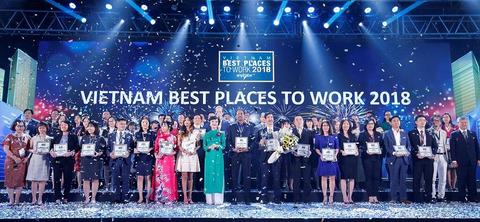
Companies receive awards at a ceremony for Viet Nam’s 100 Best Places to Work 2018 held on March 27 in HCM City. — Photo courtesy of Anphabe
Vinamilk continues to take top place on the list of 100 Best Places to Work in Viet Nam in 2018, according to a survey conducted by Anphabe, a career network of management professionals, and market research firm INTAGE Vietnam.
The annual survey measures employer brand attractiveness of 678 companies of 24 industries. The survey attracted the participation of 75,481 experienced employees.
In the Best Places to Work by Industry, respected companies continue to assume top positions, including Cargill Vietnam (agriculture/feed/forestry), KPMG Vietnam (financial services), Vingroup (real estate, hospitality and retail/wholesale/trading), Abbott Laboratories S.A. (pharmaceutical/biotech), Mercedes-Benz Vietnam Ltd. (automobile/components), and TIKI (internet/e-commerce).
The category of top 50 Vietnamese Enterprises with Most Attractive Employer Brand, included DatVietVAC, TTC Land, Bao Viet Securities, SCB, Vinasoy, Saigon Foods, Biti’s, Dat Xanh Group, CMC Corporation, VNPT, and Hung Thinh Corporation.
Exploring motivation of employees, the Vietnam Best Places to Work Survey’s results showed six motivation behaviour groups: security lover, pragmatist and attention seeker, goal achiever, value pursuer and work lover.
Each motivation group has different career objectives and ideal workplace expectations, according to the survey.
The pragmatist, for example, tends to favour advancing up the corporate ladder, expanding networks and accumulating money for future start-ups, while the value pursuer will seek challenges to learn and grow, contributing to meaningful purpose or applying knowledge and experience to create value.
The survey showed that extrinsic rewards such as salary and bonuses, job position, a nice office, and a well-known company can influence motivation, but only to a certain extent.
Intrinsic rewards contributed to 59 per cent of employees’ efforts, while extrinsic factors affected the remaining 41 per cent.
The surveys also defined five motivation-enabling factors that contribute to improve intrinsic motivation, including well-being, autonomy, competency, connection and meaning.
When employees give more positive assessment on motivation-enabling factors at their workplace, both their effort and loyalty improved significantly, according to the survey’s findings. —VNS